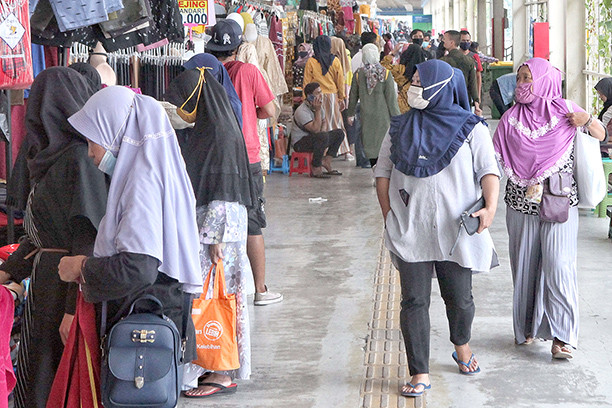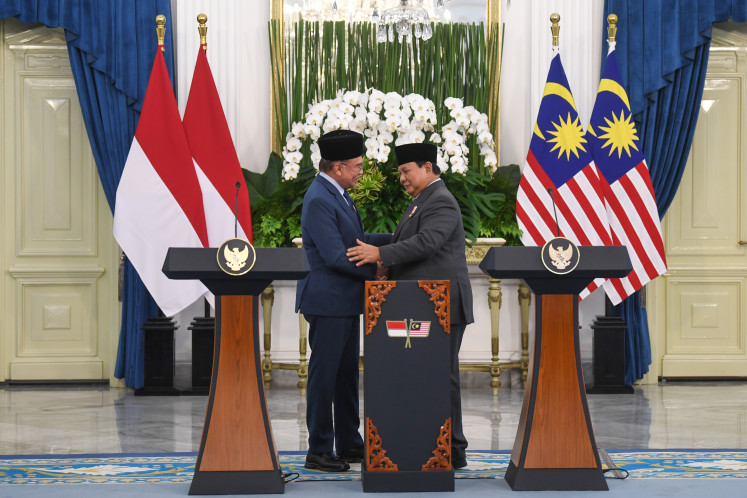Popular Reads
Top Results
Can't find what you're looking for?
View all search resultsPopular Reads
Top Results
Can't find what you're looking for?
View all search resultsExtend the restrictions
Statistics show that although the absolute number of people testing positive increased from Sept. 14, when the PSBB was reinstated, to Oct. 7, the daily number of infection cases actually dropped on 10 occasions, significantly on certain days. The record-high daily decline of 885 cases came on Sept. 20, and the second highest was on Sept. 28 with 533.
Change text size
Gift Premium Articles
to Anyone
 Old normal: Residents shop on the Tanah Abang skybridge in Central Jakarta on Sunday, a day before the Jakarta administration
reimposed full large-scale social restrictions (PSBB) for two weeks in response to soaring COVID-19 infection rates. (JP/Seto Wardhana)
Old normal: Residents shop on the Tanah Abang skybridge in Central Jakarta on Sunday, a day before the Jakarta administration
reimposed full large-scale social restrictions (PSBB) for two weeks in response to soaring COVID-19 infection rates. (JP/Seto Wardhana)
T
he Jakarta administration seems to have no option other than to continue the large-scale social restrictions (PSBB) when their current implementation period ends on Sunday. An extension will maintain the momentum of improvement and hopefully lead to flattening the curve of COVID-19 transmission in the city.
Statistics show that although the absolute number of people testing positive increased from Sept. 14, when the PSBB was reinstated, to Oct. 7, the daily number of infection cases actually dropped on 10 occasions, significantly on certain days. The record-high daily decline of 885 cases came on Sept. 20, and the second highest was on Sept. 28 with 533.
Read also: Indonesia's latest official COVID-19 figures
By comparison, the daily number of positive cases increased every day between Sept. 1 and Sept. 12, with the highest spike of 707 recorded on Sept. 2 and the second highest on Sept. 2 with 561.
As of Oct. 8, Jakarta had posted over 83,300 cases, with more than 1,800 dead, making it the main epicenter of the virus transmission in the country. Given its intensified testing, tracing and treatment, the city is on the right track in its effort to win the COVID-19 battle.
The aforementioned statistics indicate that the imposition of PSBB has started to bear fruit in the capital. The effective reproduction number has been lowered from 1.14 before the resumption of the PSBB to 1.10 currently. Jakarta once pushed the reproduction number below 1 when it enforced the PSBB for the first time from April to June.
The extension of Jakarta’s PSBB is a logical consequence of the move by neighboring West Java, which has extended the implementation of a partial lockdown in cities and regencies that abut the capital, such as Bogor, Depok and Bekasi, until Oct. 28.
Jakarta Governor Anies Baswedan has repeatedly called for close cooperation with neighboring governments in the fight against the pandemic, due to the fact that many of those employed in the capital live in its satellites.
Instead of relaxing the restrictions, and allowing COVID-19 to spread, the city administration needs to step up its game. Especially given that following a series of mass demonstrations in protest at the Job Creation Law in the city this week, which certainly did not abide by health protocols, there is a possibility that the number of positive cases will climb as health experts have warned.
Read also: PSBB are a work in progress, need constant review
As the key to containing transmission of the disease is controlling human mobility, the call to work, study and worship from home should continue. But to further contain the contagion, the city administration needs to revise the tolerable limit of workplace capacity, which is set at 50 percent for 11 essential sectors and 25 percent for non-essential fields. Jakarta should emulate neighboring countries, which have effectively responded to the pandemic such as in New South Wales in Australia, where physical distancing for businesses is set at one person per 4 square meters and one person per 2 sq. m in some circumstances. Such a measurement is more specific and easier to implement.
Stricter enforcement of the health protocols, which includes fines and social work, is needed in order to improve public compliance, which is the basic mechanism to defend the city from the virus.









